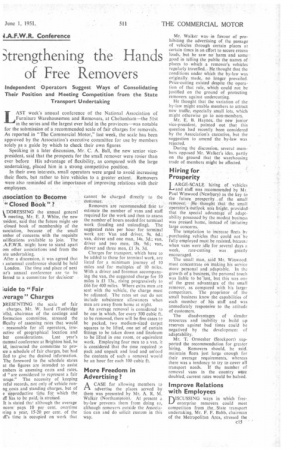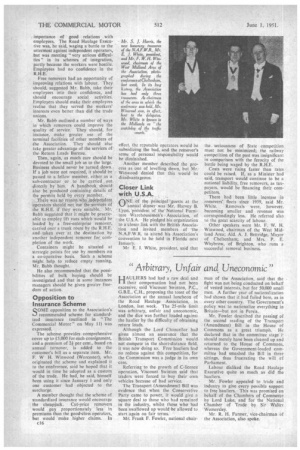trengthening the Hands of Free Removers
Page 53

Page 54

If you've noticed an error in this article please click here to report it so we can fix it.
Independent Operators Suggest Ways of Consolidating Their Position and Meeting Competition from the State Transport Undertaking
LAST week's annual conference of the National Association of Furniture Warehousemen and Removers, at Cheltenham—the 51st in the series and the largest ever held in the provinces—was notable for the submission of a recommended scale of fair charges for removals. As reported in "The Commercial Motor," last week, the scale has been approved by the Association's executive committee for use by members solely is a guide by which to check their own figures
Speaking in a later discussion, Mr. C. A. Ball, the new senior vicepresident, said that the prospects for the small remover were rosier than ever before His advantage of flexibility, as compared with the large undertaking, placed him in a strong competitive position.
In their own interests, small operators were urged to avoid increasing their fleets, but rather to hire vehicles to a greater extent. Removers were also reminded of the importance of improving relations with their employees.
■ ssociation to Become Closed Book " ?
DDRESSING the annual general 1 meeting, Mr. E. J. White, the new :csident, said that the future might see closed book of membership of the ssociation, because of the small imber of concerns with the requisite ialifications available to join. The .A.F.W:R. might have to stand apart om other associations and from the ate undertaking.
After a discussion, it was agreed that autumnal conference should be held London. The time and place of next :ar's annual conference are -to be ferred to a committee for decisiorr
iuide to "Fair ■ verage " Charges )RESENTING the scale of fair charges. Mr. W. Isard (Tunbridge 'ells), chairman of the costings and formation committee, stressed the ffiquIty of assessing rates that would, : reasonable for all operators, irre, ective of geographical location and her considerations. Last year's aumnal conference at Brighton had, he Id, instructed the committee to proice a schedule of fair charges, but had iled to give the desired information. The foreword to the schedule states at the figures are intended to assist embers in assessing coats and rates, id "are considered to represent a fair 'erage." The necessity of keeping reful records, not only of vehicle runng.costs and standing charges, but of e unproductive time for which the iff has to be paid, is stressed.
It is stated that although the average ncern pays 10 per cent. overtime iring a year, 15-20 per cent, of the iff's time is occupied on work that cannot be charged directly to the customer.
Removers are recommended first to estimate the number of vans and staff required for the work and then to assess the number of hours needed for terminal work (loading and unloading). The suggested rates per hour for terminal work are: Van and driver, 9s. 6d.; van, driver and one man, 14s. 3d.; van, driver and two men, 18s. 9d.; van, driver and three men, £1 3s. 3d.
Charges for transport, which have to be added to those for terminal work. are listed for A minimum journey of 10 miles and for multiples of 10 miles. With a driver and foreman accompanying the van, the suggested charge for 10 miles is £1 13s., rising progressively to £66 for 400 miles. Where extra men are sent with the vehicle, the charge must be adjusted. The rates set out do not include subsistence allowances when men are away from home at night.
An average removal is considered to be one in which, for every 500 cubic ft. to be removed, there will be five cases to be packed, two medium-sized carpet squares to be lifted, one set of curtain fittings to be taken down and linoleum to be lifted in one room, or equivalent work. Employing four men to a van, it is considered that the time required :o pack and unpack and load and unload the contents of such a removal would be an hour for each 100 cubic ft.
More Freedom in Advertising ?
ACASE for allowing members to advertise the places served by them was presented by Mr. A. R. M. Walker (Northampton).At present a by-law prevents them from doing so, although removers outside the Association can and do solicit custom in this way. Mr. Walker was in• favour of prohibiting the advertising of the passage of vehicles through certain places at certain times in art effort to secure return loads, but he saw no harm and some good in telling the public the names of places to which a remover's vehicles regularly travelled.. He thought that the conditions under which the by-law was originally made, no longer prevailed. Price-cutting existed despite the operation of that rule, which could not be justified on the ground of protecting removers against undercutting.
He thought that the variation of the by-law might enable members to attract new traffic, especially small lots, which might otherwise go to non-members.
Mr. E. B. Haynes, the new junior vice-president, pointed out that this question had recently been considered by the Association's executive, but the suggestion to amend the by-law was rejected.
During the discussion, several members opposed Mr. Walker's idea, partly on the ground that the warehousing trade of members might be affected.
Hiring for Prosperity LARGE-SCALE hiring of vehicles and staff was recommeaded by M/. Paul Winwood (Newbury) as the key to the future prosperity . of the small remover. I-le thought that the, small Operator's outlook Wis bright, provided that the special advantage of ,adaptability possessed by the modest business was pressed home, instead of imitating large concerns.
The temptation to increase fleets by purchasing vehicles that could not be fully employed must be resisted, becaus: when vans were idle for several days a week, rate-cutting was greatly encouraged.
The small man, said Mr. Winwood. must concentrate on making his service more personal and adaptable. In the growth of a business, the personal touch was liable to belost, but this was one of the great advantages of the small remover, as compared with his larger competitors. The proprietor of the small business knew the capabilities of each member of his staff and was immediately responsive to the attitude of customers.
The disadvantages of slender resources and inability to build up reserves against had times could he negatived by the development of adaptability.
Mr. T. Ormesher (Stockport) supported the recommendation for greater hiring. Removers should, he said, maintain fleets just large enough for their average requirements,whereas there was a tendency to try to cover all transport needs. If the number of removal vans in the country were doubled, current rates would be halved.
Improve Relations with Employees DISCUSSING ways in which freeenterprise removers could meet competition from the,. State transport undertaking, Mr. F. F. Babb, chairman of the Metropolitan Area, stressed the
. importance of good relations with employees. The Road Haulage Executive was, he said, waging a battle to the uttermost against independent operators, but was meeting "very serious difficulties" in its schemes of integration, partly because the workers were hostile. Employees had no confidence in the R.H.E.
Free removers had an opportunity of improving relations with labour. They should, suggested Mr. Babb, take their employees into their confidence, and should encourage social activities'. Employers should make their employees realise that they served the workers' interests even better than did the trade unions.
Mr. Babb outlined a number of ways in which removers could improve the quality of service. They should, for instance, •make greater use of the terminal facilities of other members of the Association_ They should also take greater advantage of the services of the Return Loads Bureau.
Then, again, as much care should be devoted to the small job as to the large. Business should never be turned down.• If a job were not required, it should be passed to a fellow member. either as a sub-contractor or to be carried out directly by him. A handbook, should also be produced containing details of the permits held by every member.
There was no reason Why independent operators should not 'use the services of the R.H.E. if they were suitable.. Mr.
• Babb suggested that it might be practicable to employ lift vans which would be loaded by a free-enterprise remover, carried over a trunk route by the R.H.E. and taken over at the destination by another independent remover for. completion of the work.
Containers might be situated at strategic points for use by members on a co-operative basis. Such a scheme might help to reduce empty running, Mr. Babb thought.
He also recommended that the possibilities of bulk buying should be investigated and that in some instances managers should be given greater freedom of action.
Opposition to Insurance Scheme SOME opposition to the Association's recommended scheme for standardized insurance (outlined in "The Commercial Motor" on May II) was expressed.
The scheme provides comprehensive cover up to 0.000 for each consignment, and a premium of 24 per cent., based en annual turnover, is added to the customer's bill as a separate item. Mr. F. W H. Winwood (Worcester), who originated the scheme and explained it to the conference, said he hoped that it would in time be adopted as a custom of the trade. He had, he said, himself been using it since January I and only one customer had objected to the surcharge.
A member thought that the scheme of standardized insurance would encourage the cheapjack. Cut-price removers would pay proportionately less in premiums than the goodsclass operators, but would 'make higher claims. In c 16 effect, the reputable operators would be subsidizing the bad, and the remover's sense of personal responsibility would be diminished.
Another member described the process as one of levelling down, but Mr. Wiriwood denied that this would be disadvantageous.
Closer Link with U.S.A.
ni..!4E. Of the principal guests at the IL/ annual 'dinner was .Mr. Harvey B. liyon, 'president of the National Furniture Warehousemen's 'Association, of the U.S.A. He 'pledged his organization to a closer link with the British Associa.tion and invited members of the N.A.F.W.R. to attend his Association's convention to be held in Florida next January.
Mr E. J. White, president, said that the, seriousness of State competition must not be minimized; the railway competition of the past was insignificant in comparison with the ferocity of the battle being waged by the R.H.E.
Costs were rising faster than rates could be raised. If, as a Minister had said, transport would continue to be a national liability, free removers, as taxpayers, would be financing their competitors.
There had been little increase in removers'. fleets since 1939, said Mr. White. Removals were, however. becoming smaller and revenue was correspondingly less. He referred also to the great scarcity of labour.
Other speakers were Mr. F. W. H. Winwood, chairman of the West Midland Area; Aid. A. J. Bettridge, Mayor of Cheltenham; and Mrs. P. E. Whybrow, of Brighton, who runs a successful removal business.




























































































